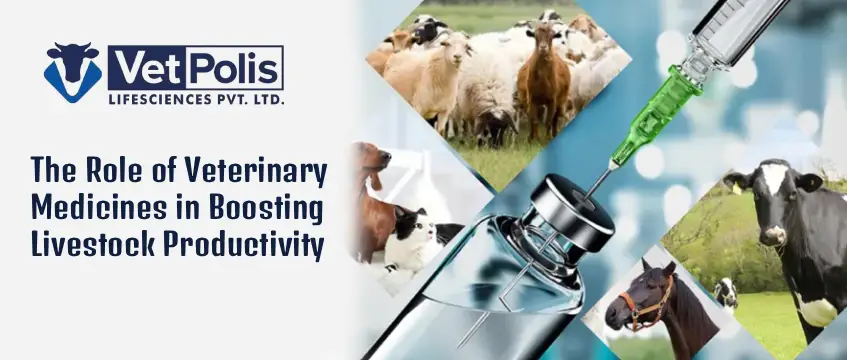The Role of Veterinary Medicines in Boosting Livestock Productivity

A vital supplier of commodities including milk, meat, and leather, livestock husbandry has long been a pillar of agriculture. For farmers, food security and economic stability are strongly impacted by the production of their herds. Diseases, parasites, and nutritional imbalances, however, pose ongoing risks to cattle and can impair their development, reproduction, and overall productivity. Veterinary medications are essential in this situation. These medications protect animal health, which not only reduces losses but also increases livestock farming’s output and effectiveness.
Why Does Livestock Productivity Matters?
To accomplish sustainable farming, livestock productivity entails maximizing the health and welfare of animals in addition to providing more milk or meat. Healthy animals create higher-quality products, develop more quickly, and breed more effectively. However, disease outbreaks have the potential to destroy whole herds, lower milk production, raise mortality, and result in large financial losses. Reliable veterinary medications, preventative healthcare, and efficient disease control are necessary to guarantee steady output.
The Role of Veterinary Medicines in Disease Prevention
It’s always better to prevent than to treat. Animals are susceptible to parasite, bacterial, and viral illnesses that spread swiftly among herds.
- Vaccines lower mortality and increase herd resilience by protecting animals against illnesses, including brucellosis, bovine viral diarrhea, and foot and mouth disease.
- Antiparasitic medications ensure that animals maintain a healthy weight and development rate by controlling external parasites like ticks and internal parasites like worms.
- When used as prescribed, antibiotics aid in healing and stop bacterial illnesses from spreading.
Improving Reproductive Health with Veterinary Medicines
Livestock production is largely dependent on reproductive efficiency. Hormonal treatments and reproductive health boosters are examples of veterinary medications that are important in:
- Addressing infections that lead to infertility.
- Regulating heat cycles to improve the results of reproduction.
- Lowering birth difficulties and increasing fertility.
Supporting Growth and Nutrition
Supplements and medications are also essential for promoting development and the absorption of nutrients. For example, to have a strong immune system, young calves need vitamins, minerals, and immunity boosters. By filling nutritional shortages, veterinary supplements promote healthy growth rates, strong bones, and disease resistance.
Additionally, medications that improve digestion or treat metabolic diseases guarantee that the feed is efficiently transformed into nutrients and energy. As a result, producers keep healthier animals and receive higher returns on their animal feed investment.
Ensuring Food Safety Through Veterinary Medicines
Veterinary medicine’s contribution to food safety is another significant facet. In addition to reducing production, livestock diseases run the danger of polluting the supply of milk and meat. Veterinary medications aid in maintaining safe, high-quality goods for human consumption by managing illnesses like parasite infections in meat animals or mastitis in dairy cattle.
Additionally, wise antibiotic usage and withdrawal schedules keep dangerous residues out of the food chain, safeguarding consumer health and preserving confidence in foods derived from animals.
Reducing Financial Losses
Every disease outbreak carries the risk of financial loss due to lower yields, higher mortality, and more expensive treatments. Veterinary medications lower these risks by maintaining the health and productivity of animals. The cost of treating widespread epidemics is far higher than that of preventive healthcare, which includes routine vaccines and deworming. For farmers, this translates into increased operational stability and profitability.
Sustainability and Animal Welfare
Veterinary medications support sustainability and animal welfare in addition to productivity. Animals lead better, less stressful lives when the burden of sickness is reduced. Veterinary healthcare promotes the balance between sustainable treatment of animals and production in sustainable farming operations.
Additionally, keeping cattle in good health eases the burden on the environment. Healthy animals use resources more effectively, making livestock production more sustainable, whereas diseased animals need more feed and resources but produce less.
Modern animal production relies heavily on veterinary medications. They guarantee food safety, promote nutrition, boost reproduction, and shield animals from illness. In addition to protecting farmers livelihoods, they help meet the rising demand for meat, milk, and other animal products throughout the world by increasing production.
The secret is to use these medications sensibly, which includes following preventative care guidelines, consulting a veterinarian, and using sound management techniques. Proper integration of veterinary medications makes livestock production a more sustainable, productive, and healthy enterprise.

